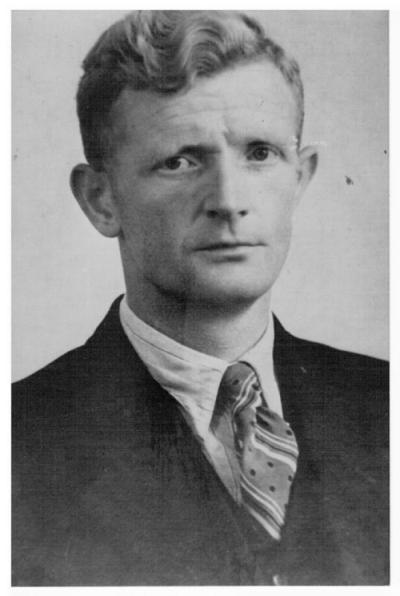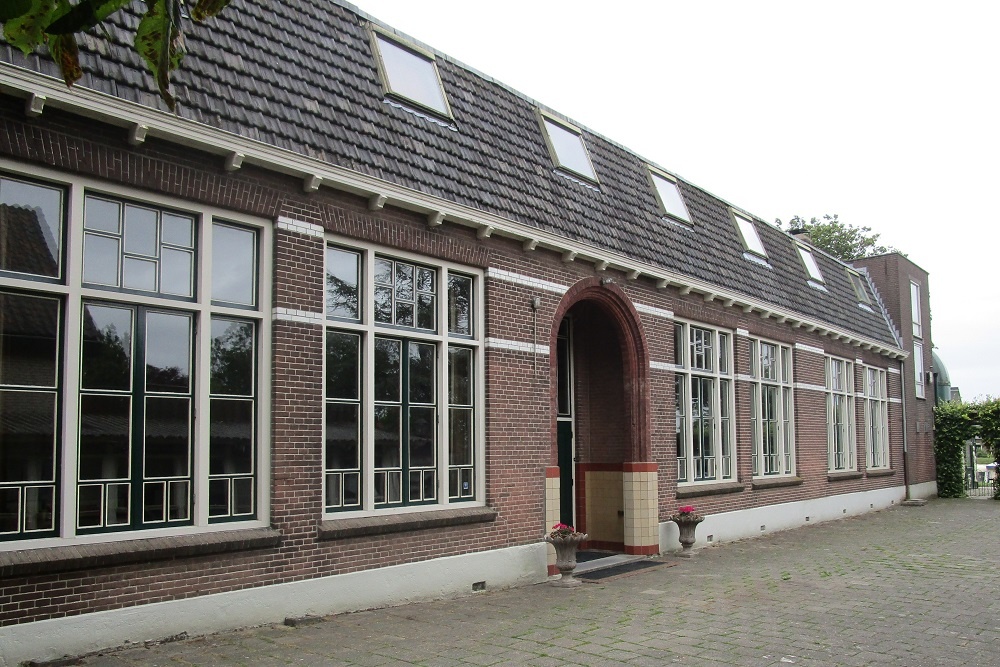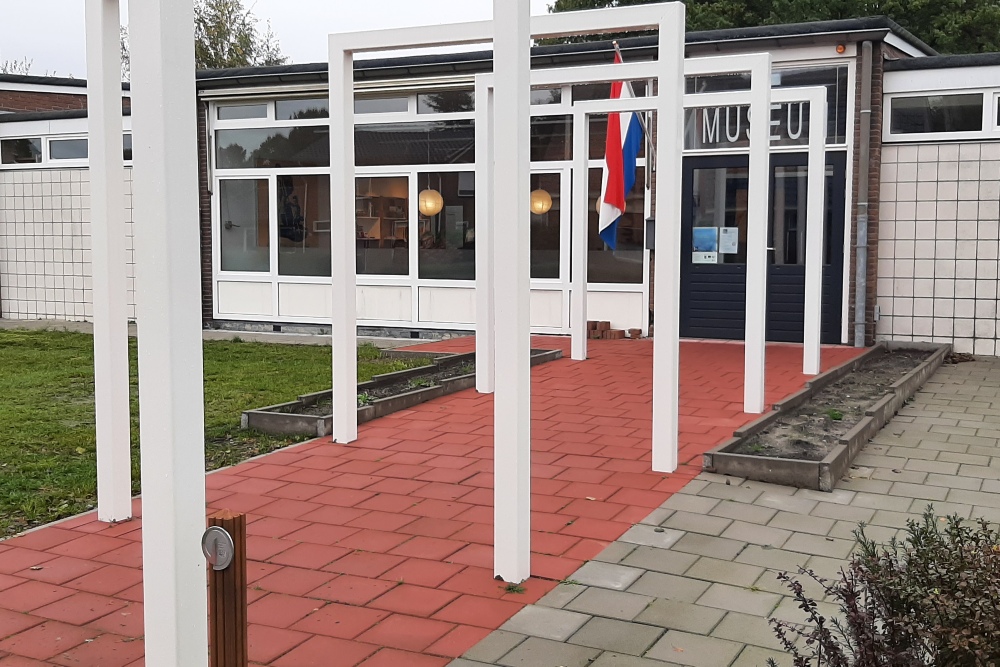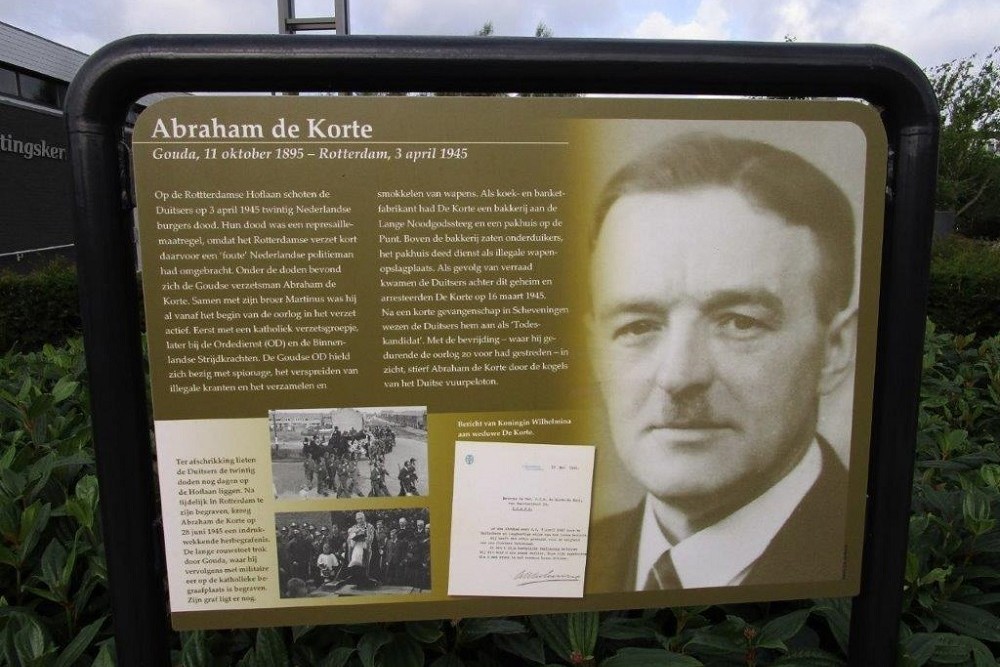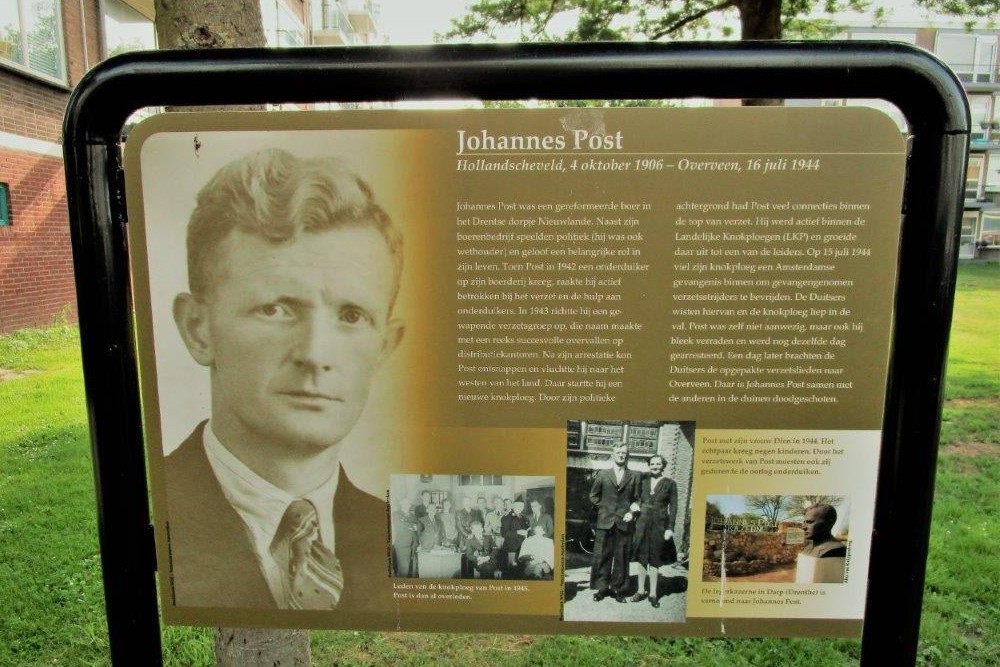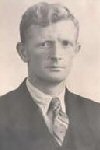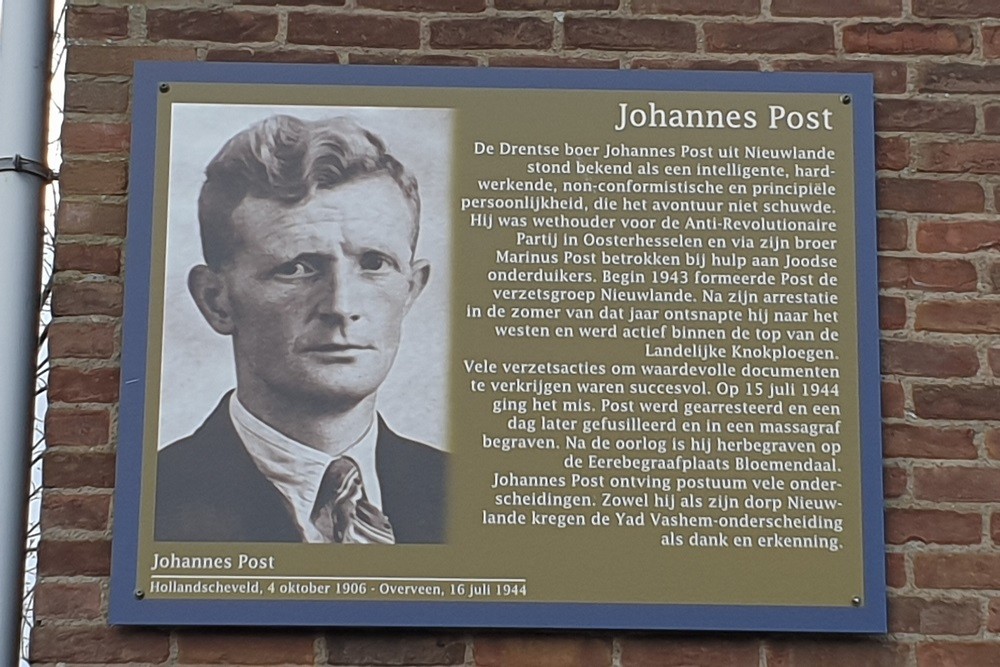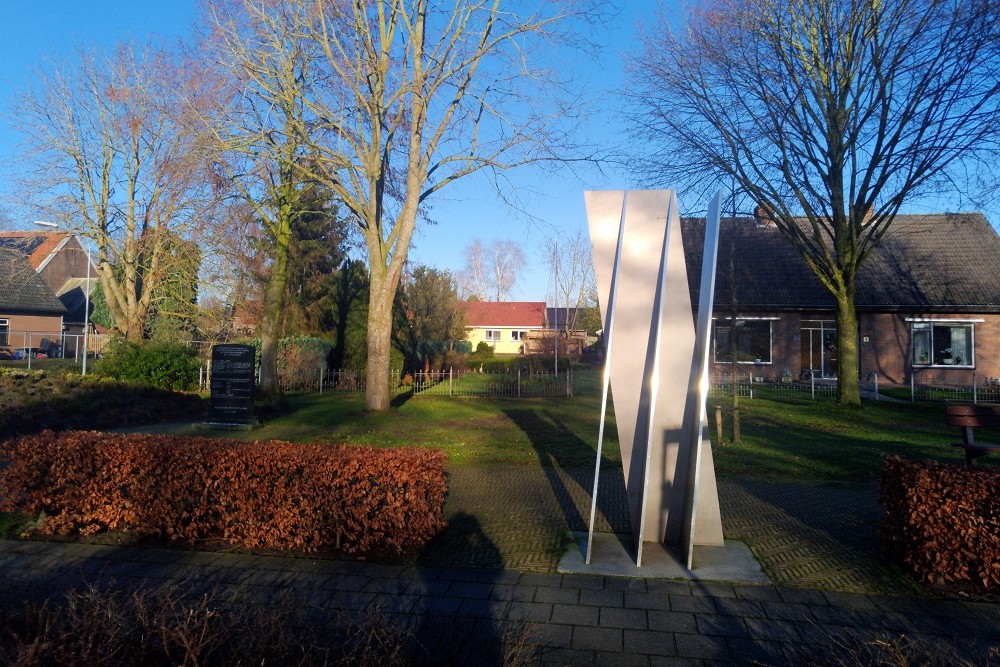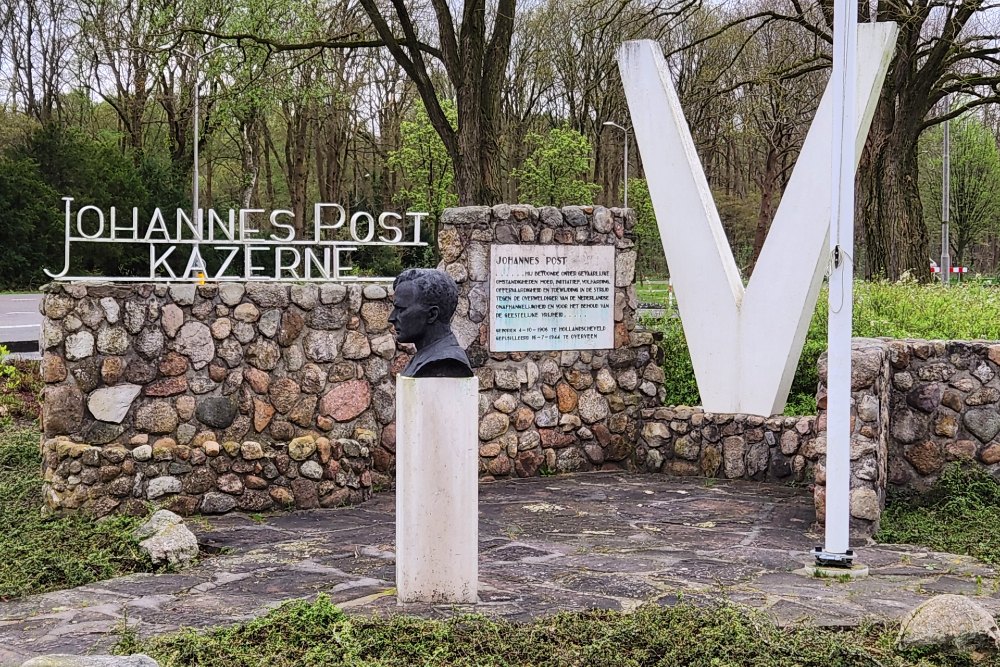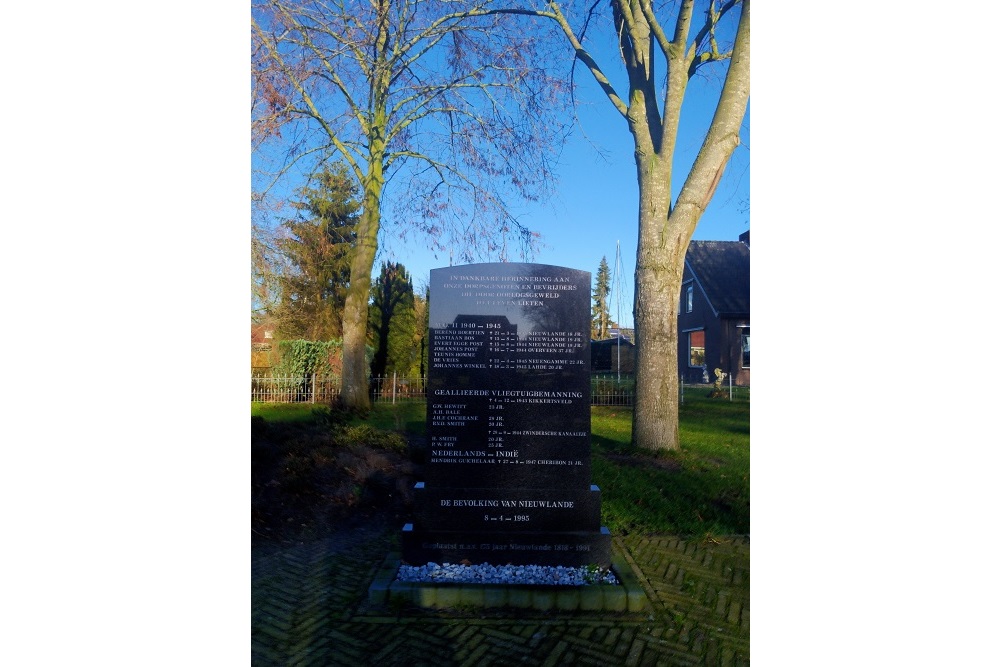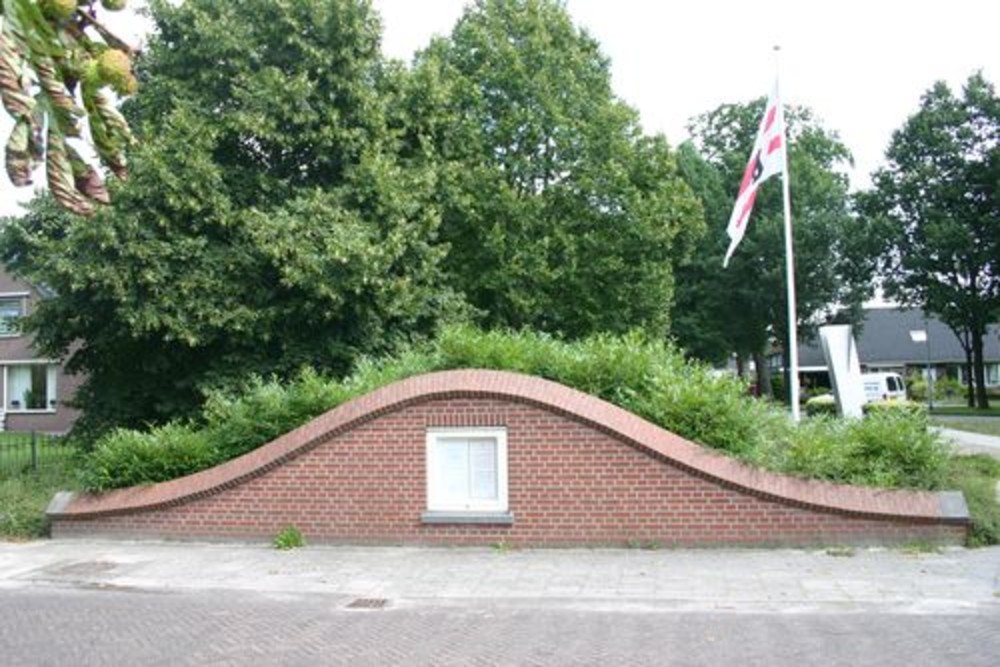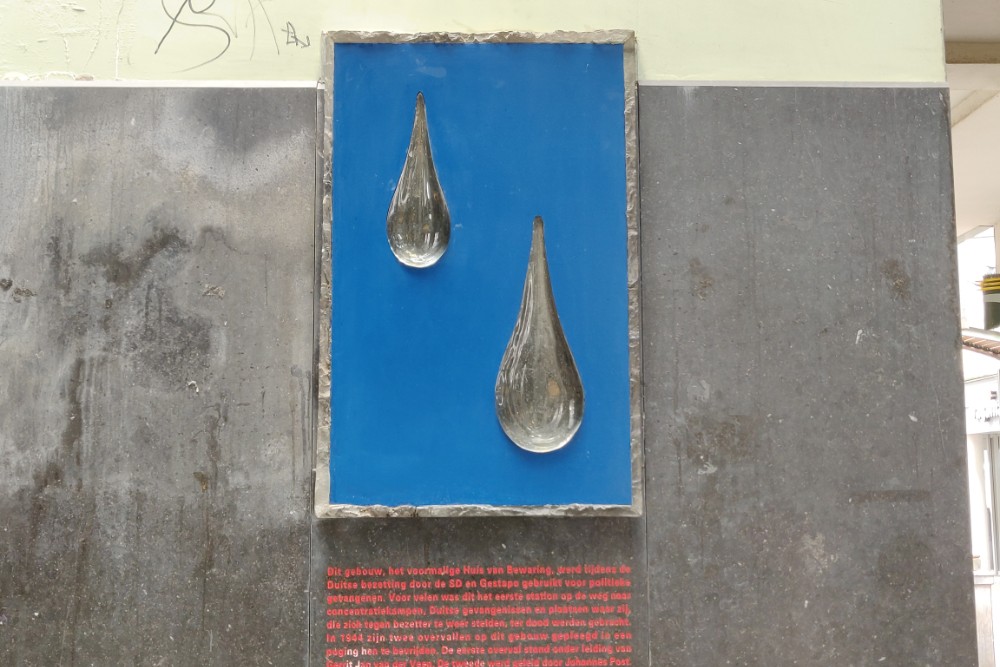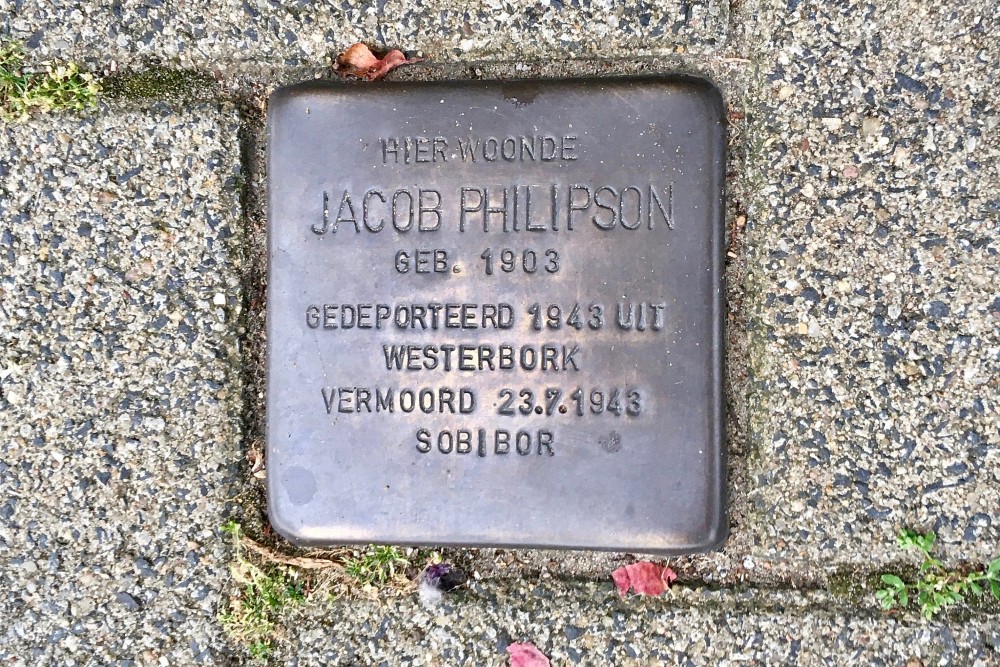Prewar period
Johannes Post was born on October 4, 1906 in the hamlet of Nieuw-Moscou in Hollandscheveld, near Hoogeveen. He was the eleventh and last child of Jan Wolters Post and Trijntje Tempen. There are few details about Johannes' childhood. One of the most informative sources about his childhood is Johannes Post's life novel (De levensroman van Johannes Post) by Anne de Vries, which is also the most famous book about his life. Another known fact is that in his youth Johannes was friends with Henk Dienske, another great resistance fighter later on. It is also known that he suffered from a poor physique in his youth; his health regularly caused concern. This is probably one of the reasons he was allowed to keep attending school. Johannes had completed primary school quite easily and attended the MULO. He attended only one year, before eventually joining his father to work on the farm. This was a big disappointment for his parents: for them, a son at college was a sign of wealth.
On May 19, 1925, at his brother Marinus' wedding, Johannes met Dina Salomons (born 3 July 1903) for the first time. They got engaged on July 29, 1929, and married on November 26 the same year. Johannes and Dina relocated to Nieuwlande. Their future reverend in Nieuwlande was Frits Slomp, more commonly known as "Frits the Tramp" during the war, whom Johannes also contacted occasionally during the war. On October 13, 1930, they had their first child, a boy named Jan Wolter. One week later, this young life came to an end. They eventually had three more sons and five daughters. The depression years had not gone unnoticed by Johannes either. There were several occasions when Johannes was on the brink of collapse. However, in the years just before the war, he had done quite well. In 1935, Johannes joined local politics to represent the Anti-Revolutionary Party (Anti Revolutionaire Partij, ARP). During the assemblies, he enjoyed active discussions and did not shy away from verbal battles with his fellow politicians. Johannes repeatedly obstructed ideas, particularly against the Social Democratic Workers Party (Sociaal Democratische Arbeiders Partij, SDAP). His principles had a definite influence here, as Johannes was a staunchly Reformed personality.
Definitielijst
- resistance
- Resistance against the enemy. Often also with armed resources.
First years of war
On May 10, 1940, German troops breached the Dutch border. On the morning of that same May 10, Johannes saw the first Germans entering the village. With two other farmers, Johannes wanted to volunteer in the Dutch army, but eventually decided against it. Five days later, the occupation had become a reality. Many claim that Johannes was a resistance fighter from the very beginning, but this is not entirely true. He expressed his first 'acts of resistance' in refusing to pay income tax and resisting against mandatory cattle registration in September 1940. Most likely, Johannes needed time to adjust to the new situation. There was one thing he could not grasp at the time, namely the German plan towards Dutch Jews. For example, history also reports that Johannes - probably without opposition - filled in the mandatory Aryan certificate for the municipal administration, which most municipal officials did at the time, by the way. Other than that, Johannes remained silent during the first two years of the occupation. At this stage of the war, people in Drenthe were not nearly as affected by the ruler's hard hand as in the big cities.
From April 30, 1942, Dutch Jews were required to wear a yellow badge marked "Jew". From this, numerous consequences ensued. It resulted in Johannes having the first person in hiding: Arnold Douwes, a reverend's son. This man acted provocatively by displaying himself in public with a star of David in May 1942. Because of that incident, the Sicherheitspolizei wanted to arrest him, but by relocating he managed to escape arrest. In the autumn of the same year, Johannes went to visit his brother Marinus, who lived in Kampen, for a few days. That visit meant a big change for Johannes. He was introduced to several Jews in hiding. His brother Marinus also allowed him to choose a revolver. This marked the beginning of the armed resistance for Johannes.
Definitielijst
- Jews
- Middle Eastern people with own religion that lived in Palestine. They distinguished themselves by their strong monotheism and the strict observance of the Law and tradition. During World War 2 the Jewish people were ruthlessly persecuted and annihilated by the German Nazis. . An estimated 6,000,000 Jews were exterminated.
- resistance
- Resistance against the enemy. Often also with armed resources.
Armed resistance
Johannes now started to focus more and more on resistance. But for the time being, it only involved people in hiding. Johannes managed to hide Jews from all over the region somewhere in Nieuwlande and its surroundings. Arnold Douwes, Johannes' hider, served as a collector of identity cards. He stole, got and bought them. In December 1942, Johannes received an invitation to a meeting in the consistory of the Christian Reformed Church where elder Zanting was to attend. The elder turned out to be his former reverend: Frits Slomp. He revealed himself as an outspoken opponent of National Socialism. It resulted from this discussion that Johannes joined the 'Exchange', also sometimes referred to as 'Organisation Frits'. This was an organisation where people in hiding were exchanged. People who needed or wanted to go into hiding came into contact with one of the members of this 'Exchange', who then tried to find a suitable hiding place for them. Also, further expansion of the organisation was discussed. Out of this organisation the later National Organisation (Landelijke Organisatie, LO) emerged. The LO was one of the largest resistance organisations in the Netherlands, founded by Frits Slomp and Helena Kuipers-Rietberg. In 1944, the organisation had around fourteen thousand members. Although Johannes had attended The Reverend Slomp's meeting, he was working much more independently. He sometimes worked together with the LO, but for most Jews he looked for a suitable hiding place without intervention from the LO. Likely Johannes preferred to work with people he knew. But that is still a guess. What is certain is that Johannes meant relatively little for the LO at a provincial level during that period.
Johannes became increasingly busy. His farm was buzzing with activity every day. It quickly became clear that Johannes was unable to manage this work on this scale alone. Although Arnold Douwes helped out, it was not enough. The work was piling up. In February 1943, a young Jewish woman, Celina Johanna Kuijper, with the alias Thea, came to Nieuwlande. Johannes picked her up in Amsterdam-Zuid. On the journey back to Nieuwlande, Johannes was impressed by Thea to the extent that he considered her suitable for his 'resistance group'. Like most resistance women, she became a courier. Her fiancé Ies Davids, alias 'Peter', joined a few weeks later. His job was to update personal identification cards.
In May 1943, former professional soldier Jan Wildschut also came to Nieuwlande. An immediate consequence of the April–May strikes of the same year. On April 29, 1943, an order was published in the evening papers that "the members of the former Dutch army will be immediately deported again as prisoners of war". The Dutch people's response was a strike which, as Johannes had warned, turned out to be a bloodbath. After these strikes, Johannes found himself busier than ever. He decided that he should switch to raiding offices of Local Office Holders (Plaatselijke Bureauhouders, PBH) with his 'resistance group'. These PBHs were the local representatives of the Provincial Food Commissioners, who were supposed to oversee food distribution and its production. Johannes was actually more or less forced to do so by the situation. All those people in hiding for whom he found a place also had to have coupons, identity cards and so forth. In fact, Johannes had one of the first armed squads.
On Wednesday June 23, 1943, Johannes and his resistance group raided four PBHs in one day. Drenthe has already had its first raid earlier, on April 16, 1943 in Zuidwolde. But Johannes' raids were unique because never before had so many PBHs been raided in a single day. Unjustly, some claim that Johannes had been the instigator of armed resistance in the Netherlands. As early as October 14, 1942, Theo Dobbe and seven comrades successfully raided the Joure distribution office. After the raid on the PHBs, Johannes and his resistance group engaged in several acts of resistance, such as arson in an empty Resilience Department building (Weerafdeling, WA). The continuous arrival of people in hiding was alarming, partly due to the actions of The Reverend Slomp, who told people everywhere that "Nieuwlande can house everyone". During this period, Johannes's resistance group grew relentlessly, until, at one point, the group seemed to have split up. Members of the resistance group had spread throughout the country, as there was a constant threat from the Sicherheitspolizei.
July 16, 1943 was an important day for Johannes; it was also the first day of his last year of life. This day seemed to end in tragedy. Johannes and Thea went to Ugchelen on that day, probably to place people in hiding. However, arriving at the guesthouse 'Elyo-Zamy', they were ambushed by the Sicherheitspolizei, who had raided the guesthouse earlier that day. Johannes and Thea were detained at the police station in Apeldoorn. Johannes tried to escape the next day, but because he failed to find a good hiding place quickly enough, he was arrested again. But the following day, July 18, Johannes was freed by a policeman. Thea's life ended in Auschwitz, where she was gassed immediately upon arrival.
The year 1943 ended badly for Johannes' resistance group as three raids on distribution offices failed. The year 1944 had a much better start: immediately on January 4, a distribution office was successfully raided. In January 1944, Johannes and his armed squad (knokploeg, KP) settled in Breda. They began to use this city as their base of operations. This proved to be a very suitable base; the 'KP-Johannes' booked quite a series of successes. In early 1944, there was an agreement with the LO, in which Johannes pledged to hand over everything he had captured to the top of the LO. In February, his KP carried out another raid in which fifty-six pistols were looted. There are rumours that Johannes may also have had plans to cross over to England during this period.
Definitielijst
- Jews
- Middle Eastern people with own religion that lived in Palestine. They distinguished themselves by their strong monotheism and the strict observance of the Law and tradition. During World War 2 the Jewish people were ruthlessly persecuted and annihilated by the German Nazis. . An estimated 6,000,000 Jews were exterminated.
- knokploeg
- Literally ‘assault team’ (abbreviated KP) and the term used by the Dutch resistance for the many locally organized armed fighting groups that undertook various resistance actions, ranging from sabotage and assassination to stealing food stamps and forging false ID documents.
- National Socialism
- A political ideology drawn up by Hitler based on the superiority of the German race, the leader principle and fierce nationalism that was fed by the hard Peace of Versailles. National socialism was anti-democratic and racist. The doctrine was elaborated in Mein Kampf and organised in the NSDAP. From 1933 to 1945 National socialism was the basis of totalitarian Germany.
- raid
- Fast military raid in enemy territory
- resistance
- Resistance against the enemy. Often also with armed resources.
- Socialism
- Political ideology aiming at slight or no class differences. Means of production are owned by the state. Evolved as a response to capitalism. Karl Marx tried to substantiate socialism scientific.
- WA
- Abbreviation of defence department, assault groups of the NSB
In the top
Around March 1944, Johannes received an invitation to a meeting of the top LKP (Landelijke Knokploegen, National Armed Squads). This LKP had a so-called leader, Hilbert van Dijk, a treasurer, Izak van der Horst and two members who took care of a so-called 'raiding schedule'. This schedule was drawn up according to wishes coming from civilians or resistance groups. In order not to increase the risk of the members of the KP participating, the agreement was made that only what the LO needed would be raided. The two men, Leendert Marinus Valstar and Liepke Scheepstra, were extremely busy. Mainly Scheepstra, for whom the work became too much, advocated having a representative of their own in the north-east and in the south-east. In the southeast, there was no problem appointing its own representative. Since many Roman Catholics lived there, Roman Catholic Hans Dobbe was chosen. But in the north-east, appointing a representative was a little trickier. Van der Horst suggested Johannes Post to fill that position. However, not all the top approved of this. This was due, among other things, to mutual tensions between Leendert (Valstar) and him. Johannes was given responsibility for the three northern provinces, but it was agreed that he would not attend the assemblies. Johannes would get the relevant information from Scheepstra. Despite those imposed limitations, Johannes was honoured: he certainly felt that his work was appreciated in this.
After the following Easter weekend, Johannes left for the north to set up the organisation there. He was forced to part ways with his own KP, which continued under the leadership of Jan Wildschut. However, this KP never became a great success. Once he arrived in the north, Johannes tried to convince resistance groups to unite in a provincial alliance. So they joined forces and local resistance groups were incorporated into the LKP. In Drenthe this wasn't difficult, but in Groningen it wasn't so easy. There was a lot of talking to do here before it was even slightly up and running. In Friesland however, everything went smoothly. They had two good leaders who had things in place and were open to discussion.
After Johannes finally succeeded in this task, he received the news that Leendert Valstar (fellow top Member) had been arrested in Delft. The northern provinces had to do without Johannes for a while, as he rushed to Rotterdam. Meanwhile, fellow top member Izak van der Horst was also arrested. The Sicherheitspolizei seemed to swiftly obliterate the entire top. Many friends and acquaintances of Johannes were arrested. Initially, two other replacements for Valstar were appointed. However, one preferred to stay where he was, while the other didn't seem to be able to handle the task after a short period. Suitable people were not readily available for such a tough job with the responsibility that came with it. Johannes, however, was one of the people, capable of undertaking this job. That is why Johannes became Valstar's successor. But the men who had first worked under Leendert Valstar had little faith in Johannes. This was probably also because Johannes tailored Valstar's working methods to his own wishes. In the days that followed, fellow top member Scheepstra had a stunning victory on Sunday 11 June 1944. He carried out a raid on a prison in Arnhem, freeing fifty-four prisoners. Two days after this successful raid, fellow top member Izak van der Horst also got arrested. This was yet another major blow to the top. Hilbert van Dijk had increasingly focused on LO work. As a result, only one person from the original quartet was still in the top, namely Liepke Scheepstra. After this arrest, Johannes changed. According to a post-war statement by Scheepstra: "When Izak was arrested, things suddenly changed. Johannes seemed like a different person, too." Johannes and Liepke Scheepstra became somewhat rivalrous. Scheepstra tended to take the lead, but as Johannes was 12 years his senior, he certainly wanted to hold his own. As the work had now multiplied for the two, Hilbert van Dijk came to replace Izak in part.
Johannes settled with his headquarters in Amsterdam. His hiding place had a constant flow of people coming and going; the bell rang all day long. At the time, Johannes was also in charge of the distribution of weapons within the LKP. In response to a letter from England, Johannes and fellow top members had several heated meetings in late June. As a result of this letter, politics would come into play in resistance work. Of course, there had always been frictions within the resistance. One example was that the Council of Resistance (Raad Van Verzet, RVV) included many communists, so they had little cooperation with the LO and LKP. This was due to the many church members in the LO and LKP. This was something the RVV did not approve of; one of their slogans was 'Religion is opium for the people'. However, a specific person's political beliefs were not to dominate resistance work, as this could lead to unpleasant consequences. Armed squads might break up because of disagreements; men would worsen their mental state with such discussions. So Johannes objected to this.
On June 26, reports came that Jan Wildschut, Johannes' combat partner from the very beginning, had been arrested. He had been arrested just after a failed raid on Johannes' orders. This arrest ultimately became Johannes' undoing. Johannes must have been thinking of freeing Jan from the moment he first heard about this. When fellow top Member Scheepstra also had to go into hiding on June 29, Johannes found himself virtually alone in charge of the LKP. He couldn't manage this successfully as the work assigned to him was just too much to handle to everyone's satisfaction.
Definitielijst
- raid
- Fast military raid in enemy territory
- resistance
- Resistance against the enemy. Often also with armed resources.
His final raid and death
Wildschut was captured because of the actions of a member of the NSB, which was common. When he wanted to escape, the NSB member in question threw his bicycle in front of Wildschut, causing him to fall. He was then arrested and taken to the House of Detention on the Weteringschans in Amsterdam. This was a heavy blow for Johannes. His mind was set on devising a raid on the House of Detention in order to free Wildschut and many others, including Henk Dienske. Altogether, this involved seventy 'severe cases', who had nothing left to expect in their lives but to die by a bullet.
From his hiding place, Johannes oversaw the options. He indicated in the process that he intended to carry out the entire raid on his own authority. He would only be assisted by some old resistance buddies, whom he knew would walk through fire for him.
His first plan, an armed storming of the complex, was discouraged by a "good" guard. The second plan – to commit a staged burglary somewhere and bring these burglars to the Detention House with detectives – was also dismissed.
When Johannes and Hilbert van Dijk found out that the prison could also be accessed through the caretaker's house, they devised a third plan: a raid from the caretaker's house. Not all problems were solved with this. More help was needed, help from the House of Detention. They found a certain Jan Boogaard, a Dutch SS member, who wanted to rehabilitate himself. This Boogaard proved to be an outstanding help. He offered plenty of advice, partly based on the map of the prison they got through Wim Speelman. In the end, Boogaard would play the key role. They agreed that the raid would be carried out in the early morning of July 15. But there was one condition for Boogaard: his mother, with whom he lived, had to go into hiding elsewhere in the country as collateral under the supervision of the KP. At the crucial moment, she proved unfit to travel. On the evening of July 14, the raid participants met in the caretaker's house. Johannes and Hilbert were not there themselves, as per the agreements within the top.
That night, everything went wrong. Boogaard - the traitor, because from the beginning he had been in touch with the staff of Lages who was chief of the Sicherheitspolizei in Amsterdam - opened the door to the prison at the agreed time. After a few minutes - the men were scheduled to wait 15 minutes before proceeding to the raid - they heard the notorious "Hände hoch! Jeder Widerstand ist sinnlos!". They opened fire on the raiders, some of whom were hit. Some of them made it over the four-metre high bare wall of the courtyard using all their strength. Six raiders were immediately arrested. Johannes and Hilbert, who had to pick up Boogaard at his house, found themselves in a tight spot there. Johannes was arrested at the scene and Hilbert was later betrayed by local residents. Because of this, the raid that would be a great success for the Dutch resistance became a tragedy.
After being briefly interrogated, Johannes Post was executed the next day on July 16, 1944 shortly after noon, together with thirteen others in the dunes near Overveen. He was reburied in the Bloemendaal Cemetery of Honour on November 27, 1945.
Johannes Post, characterised by Dr J.A.H.J.S. Bruins Slot as "a fantastic freebooter", would not have become so famous if Anne de Vries had not written the life novel about him. Through first short articles in national newspapers and then publishing a book, Johannes Post has slowly become a myth. His last raid will have certainly contributed to this. No doubt there are resistance figures with more 'raids' and achievements to their name than Johannes Post, but that definitely does not invalidate the rewarding work Johannes Post did for his homeland.
Definitielijst
- NSB
- National Socialist Movement. Dutch political party sympathising with the Nazis.
- raid
- Fast military raid in enemy territory
- resistance
- Resistance against the enemy. Often also with armed resources.
Information
- Article by:
- Egbert van de Schootbrugge
- Translated by:
- Sophie Louwers
- Published on:
- 19-01-2025
- Feedback?
- Send it!
